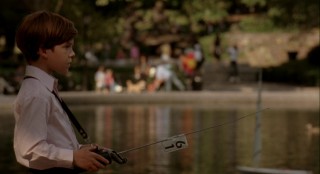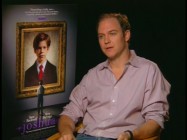By Christopher Disher
As Sundance glitters on in the mountains this week, it is fitting to point out that one sparkle from last year, Joshua, shimmered in the eyes of at least one studio.
Fox Searchlight joined the ranks of other indie branches and walked away from Utah having added Joshua and two other films to their library in 2007. Making only around half a million dollars worldwide, it isn't safe to say the purchase of Joshua was a sound business move. But if earnings hold no measure to the art, it was clearly a wise investment.
The opening credits roll over shots of children playing soccer in the middle of New York City's Central Park. Music plays lightly over the muted natural sound, ethereally introducing the oddity that is young Joshua Carin (Jacob Kogan). The boy's father, Brad (Sam Rockwell), is constantly torn between each member of his family, charmingly catering to their needs. When Joshua begins to act suspiciously towards his newborn sister, the Carin family lets loose and it's up to Brad to pull them back together. Slowly he begins to suspect his son is up to something diabolical, but by then the damage has been done.


Shot in only 25 days, Joshua is a well-crafted, interesting and fresh thriller with enough substance to sustain the intellectual viewer and enough mystery to keep everyone else attentive. What sets it apart from similarly themed works is its expert storytelling -- at times feeling more like a Roman Polanski film than a first swing from a relative newcomer at fiction. Writer-director George Ratliff has helmed feature-length documentaries in the past, but Joshua is his first real stab at narrative filmmaking. The opening scene of the film is enough to assert his abilities. Wrought with tension, Ratliff introduces all of the main characters, the conflict, the theme, and the relationships between each character in a believable and chaotic fashion. The use of sound, music, character quirks and motivations all layer upon one another and clash in an oddly melodic way. The tension is well played here and throughout, as the boy Joshua quickly and inexplicably turns sour.
If for no other reason, Joshua excels simply by being a delight to watch. The film's eerie mood is enhanced by well-chosen camera angles, a constantly changing color vibrance, and a piano score that's in harmony with the mischief of the young pianist. There is plenty of substance to bite into and even chew. Ratcliff uses religion, mythology, and literature to complicate a character who is already a mess on the inside but confident and together on the outside.
The acting performances are all solid as well. The eponymous boy is skillfully played by Jacob Kogan -- a performance that rarely shows the signs of a beginning actor. Though unrealistically naive, Brad remains compelling through a nuanced performance by Sam Rockwell. If it were not for his adept acting ability, many of the scenes with Kogan would have felt stale.


Joshua keeps to the psychological thriller genre well enough to distance itself from absurdity and inanity and thereby dismisses some of the annoying clichι of its creepy-child sub-genre. Nevertheless, the film hiccups at moments it should have otherwise transcended. Three or more times, Joshua surprises his parents by standing silently in a door frame. Dealt this and other genre-worn techniques, the viewer is manipulated into believing Joshua is a diabolical schemer and not a confused though crafty pre-adolescent.
Joshua's flaw is rarely played out and is instead disguised with tricks, which ultimately come across as false and juvenile. At times, believability is also lacking. In one scene, a pediatrician's reasoning for why Lily, the baby, won't stop crying is laughably, "Maybe she just has a lot to say." It's minor enough to be dismissed but also minor enough to wonder why the writers, who wrote an otherwise solid script, could fail so simply.
There are plenty of moments to pause and consider what is happening to this boy, Joshua, who seems innocent at times and ambivalent at others. The tagline reads, "The story of a perfect boy who had a perfect plan." Yet the filmmakers spend the entire 106-minute runtime bringing that into question. It patiently reveals details yet remains engaging as layer after layer of the mystery is revealed and sometimes covered back up by the momentarily inexplicable. In fact, the film tends to err with ambiguity in its conclusion in much the same way as the film develops. Even so, the story is so carefully articulated that an obvious conclusion would be much less satisfying.
Much of Joshua works because of shocking plot points. To mention them here would be a disservice. As a whole, the film runs a straight course with plenty of questions and surprises to hold interest and enough depth to entice a bit of research.
 |
DVD Details
1.85:1 Anamorphic Widescreen
DTS 5.1 (English), Dolby Digital 5.1 (English),
Dolby Surround (Spanish)
Subtitles: English, Spanish
Closed Captioned; Extras Not Subtitled
Release Date: January 8, 2008
Suggested Retail Price: $14.98 (Reduced from $27.98)
Single-sided, dual-layered disc (DVD-9) |
VIDEO and AUDIO
For a screener disc, the audio and video are of surprisingly good quality, although the final product is sure to be an improvement. The native aspect ratio of the DVD reviewed is 1.85:1 anamorphic widescreen. There is some grain in the picture but, according to the filmmakers, this is intentional. Due to the bleach bypass process in post-production, the colors gradually become washed out, the contrast increases, and therefore the grain also increases. Still, the black areas retain their depth without noticeable color noise.
The audio selection offers a gracious choice of four audio tracks: DTS 5.1 and Dolby Digital 5.1 in English, with the remaining two tracks being Spanish Dolby surround and the commentary. The film is very ordinary in terms of sound, though the design is well calculated, so a DTS track is nice but perhaps unneeded. A 2.0 English track might have been a better offering for the many people not watching this on a surround sound home theater system. While French-speaking Canadians are out of luck for both audio and on-screen text, an English subtitles track that has audio prompts for the hearing impaired and is joined by a Spanish translation.



BONUS FEATURES and MENUS
The special features appear quite deep at first glance but most of them run short. The most valuable offering is the audio commentary by writer-director George Ratliff and co-writer David Gilbert. The track is both informative and upbeat, not self-absorbed -- unlike other commentaries with producers, directors, and actors all lauding one another.
Next up are 18 interviews (12:05) from six cast and crew members: actors Jacob Kogan, Sam Rockwell, and Vera Farmiga, Ratliff, producer Dorfman, and production designer Rochelle Berliner.
Each interview is around a minute or less and, while informative at times, they're evidently lacking the efforts of a seemingly lazy EPK crew to create a solid featurette. Most clips are slow and repetitive. While young Kogan is articulate, everything he says sounds as if it came from the director's mouth first. The interviews with Farmiga and the crew supply a little more substance.
The next item is a clip of the audition tape from Jacob Kogan (3:26). It's only a stagnant shot on Kogan but worth watching to compare to his final performance in the film.
The supplemental materials also include the letterboxed music video for "Fly" by Dave Matthews (4:11). Matthews wrote the song specifically for the film, which was produced by ATO Pictures, a company he oversees. The artist never makes an appearance here, however, as the video relies solely on film clips which contain spoilers and may give away the entire film to a perceptive observer.
Concluding the menu are five deleted scenes (6:47) with no commentary, the Joshua theatrical trailer (2:23), and additional trailers from other Fox horror flicks Wrong Turn 2, The Tripper, and Cover.
Mimicking the serene moments of Joshua, the 16x9 title menu is animated with sliding glass panes and accompanied by the same Beethoven Sonata featured prominently throughout the film. None of the other menus are animated or musical, but all are easy to navigate.


CLOSING THOUGHTS
Joshua is a solidly produced independent film that excels both narratively and cinematographically. It deserves attention outside of its niche and would likely be enjoyed by anyone appreciative of drama and mystery. It's a film grounded in reality, defiantly dismissive of the paranormal, and eager to shine.
More on the DVD / Buy from Amazon.com












